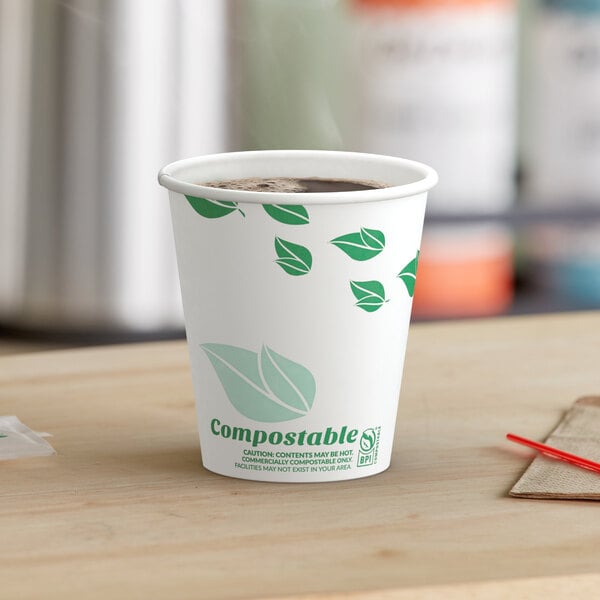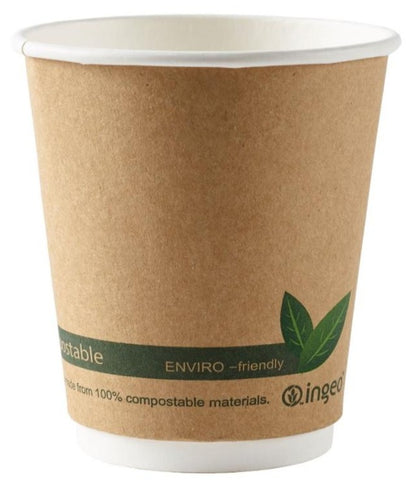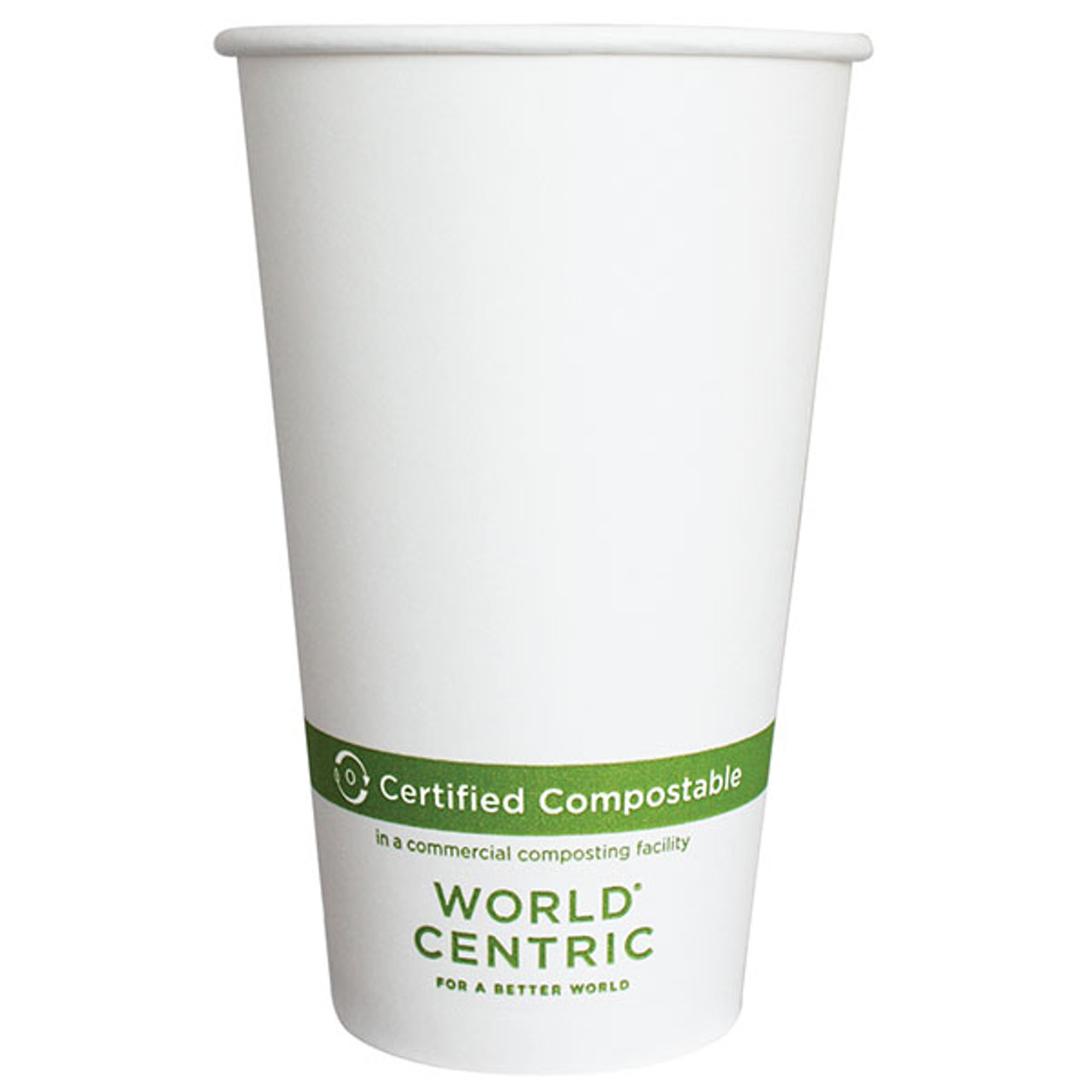What Are Compostable Coffee Cups and How Do They Work?

Compostable coffee cups are a smart choice for those looking to make eco-friendly decisions. Made from renewable resources, these cups break down safely in composting environments. They differ significantly from traditional coffee cups, which often have plastic linings that can take years to decompose.
What materials are used in compostable coffee cups?

Compostable coffee cups are typically made from materials like polylactic acid (PLA) and bioPBS (bio-based polybutylene succinate). PLA is derived from renewable resources, such as corn starch. This material helps reduce the carbon footprint when compared to plastic products. In contrast, bioPBS has gained attention for its ability to be both recyclable and compostable, like the cups used in Starbucks' pilot program launched in March 2023.
How do compostable coffee cups break down compared to traditional cups?

Compostable coffee cups can break down within 90 to 180 days in commercial composting facilities. On the other hand, traditional cups with a plastic lining can remain in landfills for up to 30 years. The process of composting involves the decomposition of organic material through microorganisms, resulting in nutrient-rich soil. Unlike plastic-lined cups, which may leach harmful chemicals, compostable cups decompose without leaving toxic residue.
What are the benefits of using compostable coffee cups for businesses and consumers?
There are many benefits to using compostable coffee cups:
- Environmental Responsibility: Choosing compostable options reduces landfill waste, which aligns with global efforts to combat climate change.
- Fogyasztói vonzerő: Many consumers prefer businesses that prioritize sustainability. Offering compostable cups can enhance a brand's image and increase customer loyalty.
- Lower Carbon Footprint: The production and disposal of compostable cups generally result in lower greenhouse gas emissions compared to traditional plastic cups.
Businesses transitioning to compostable cups gain a competitive edge. They show their commitment to sustainability and attract eco-conscious customers.
Are there specific standards or certifications for compostable coffee cups?
Yes, there are standards and certifications for compostable coffee cups. The Biodegradable Products Institute (BPI) certifies products that meet strict compostability criteria. These cups must decompose into non-toxic components within a specific time frame under commercial composting conditions. Products bearing this certification assure users that the cups meet established environmental standards.
What is the environmental impact of traditional versus compostable coffee cups?
The environmental impact of traditional coffee cups is significant. A mere 4% of coffee cups in the UK are recycled, leading to wasted resources. These cups often end up in landfills, contributing to pollution and greenhouse gas emissions. On the flip side, compostable cups help divert waste away from landfills, promoting recycling and composting efforts.
Research from the Green Science Policy Institute shows that compostable materials drastically reduce landfill waste when disposed of properly. Compostable coffee cups support sustainable waste management practices, helping the environment.
How long does it take for compostable coffee cups to decompose in different environments?
The decomposition time for compostable cups largely depends on the environment. In industrial composting settings, they can break down in as little as 90 days. In municipal composting facilities, the timeframe may extend to 180 days. In backyard composts, decomposition can take longer—up to a year—due to lower temperatures and less ideal composting conditions.
What features make compostable coffee cups suitable for hot or cold beverages?
Compostable coffee cups are designed to handle both hot and cold drinks. Key features include:
- Heat Resistance: Many compostable cups can withstand temperatures up to 220°F (104°C), making them ideal for hot beverages like coffee and hot chocolate.
- Soak-Proof Lining: Cups with a PLA lining prevent leaks and maintain beverage integrity. This helps ensure that drinks stay hot without damaging the cup.
- Microwave and Freezer Safe: Certain brands ensure their compostable cups are microwave-safe, making them versatile.
Companies like Good Start Packaging highlight these features. They use PLA-lined paper for both hot and cold drinks, ensuring safety and functionality.
In conclusion, compostable coffee cups are a vital step toward reducing waste and supporting sustainability. With advancements in materials and production methods, they offer a practical alternative to traditional cups while benefiting the environment.
Where Can You Buy Compostable Coffee Cups?
Finding compostable coffee cups is easier than ever. Many popular brands make a wide variety of eco-friendly options. They offer features designed for both hot and cold beverages. Here are some of the popular brands and what they provide:
Popular Brands Offering Compostable Coffee Cups
| Márka | Jellemzők |
|---|---|
| Starbucks | Currently running a pilot program using cups made of bioPBS. |
| Greenprint | Uses a unique aqueous lining for better compostability. |
| World Centric | Offers a range of compostable hot and cold cups. |
| Good Start Packaging | Provides PLA-lined paper cups for hot and cold drinks, with 15 years in eco-friendly supply. |
| Go-Compost | Focuses on a complete range of compostable products, including various cup sizes and colors. |
| Phade | Made from paper and PHA derived from canola oil, best for hot beverages, though faces some branding challenges. |
Affordable Options for Compostable Coffee Cups
You can easily find affordable compostable coffee cups both online and in stores. Popular online marketplaces like Amazon and specialized eco-focused sites provide a wide selection at competitive prices. Local health food stores and grocery chains increasingly stock these products due to rising consumer demand. If you’re looking to pick some up in person, check:
- Health Food Stores
- Local Grocery Chains
- Eco-Friendly Product Stores
Bulk Purchasing Options for Businesses
Bulk purchasing offers a cost-effective way for businesses and organizations to buy compostable coffee cups. Retailers or wholesalers often give discounts on bulk orders. This saves both money and packaging waste. Many suppliers provide customized quotes based on needs. It's common for businesses to order thousands of cups at a time, which reduces individual packaging and shipping costs.
Local Suppliers for Compostable Coffee Cups
In addition to online shopping, you can find local suppliers for compostable coffee cups. Local distributors often carry specific brands and can provide samples for quality assurance. To locate suppliers near you:
-
Search for Local Distributors: Look for eco-friendly packaging suppliers in your area. Many specialize in sustainable products.
-
Attend Local Business Expos: These events often showcase local green products, including compostable cups.
Evaluating Quality and Sustainability
When selecting compostable coffee cups, evaluating quality and sustainability is essential. You can check several factors:
| Tényező | Megfontolások |
|---|---|
| Anyagok | Ensure they use plant-based materials like PLA or bioPBS. |
| Certifications | Look for certifications from organizations like the Biodegradable Products Institute (BPI). |
| Decomposition Rates | Check how long they take to break down—most compostable cups should decompose in 90 to 180 days under ideal conditions. |
| Felhasználói vélemények | Look for customer reviews addressing performance quality and sustainability claims. |
Price Ranges for Compostable Coffee Cups
Compostable coffee cups generally range in price. You might find options from as low as $0.10 to $0.50 per cup based on the brand and quality. Bulk orders can often lower these costs:
| Csésze mérete (oz) | Price Range per Cup |
|---|---|
| Small (8 oz) | $0.10 – $0.25 |
| Medium (12 oz) | $0.15 – $0.30 |
| Large (16 oz) | $0.20 – $0.50 |
Enhancing Brand Visibility with Custom Printed Options
Custom printed compostable cups are an excellent way to enhance brand visibility. Many suppliers offer this service, allowing businesses to showcase their logo and design. This usually involves an extra fee but can lead to increased brand recognition.
Custom branding on cups can also help communicate your commitment to sustainability. It positions your business positively in the eyes of environmentally conscious consumers. Businesses using custom printed compostable cups can engage their audience as they enjoy their favorite beverages, creating a noteworthy impression.
Compostable coffee cups are not just another packaging option; they represent a step toward sustainability. When you consider purchasing, evaluating, and understanding your options, you contribute to a greener planet. The increase in the availability and variety fuels the transition to eco-friendly practices.
Compostable coffee cups offer practical solutions to the environmental impact of traditional ones. And knowing where to buy them empowers both consumers and businesses on their eco-friendly journey.
What Are the Comparisons Between Compostable, Recyclable, and Traditional Coffee Cups?
Compostable coffee cups are a great alternative to traditional and recyclable coffee cups. Each type of cup has different properties, advantages, and challenges.
How do compostable coffee cups differ from recyclable and traditional plastic cups?
Compostable coffee cups use materials like polylactic acid (PLA) and paper lined with bioPBS. These materials break down into natural elements when composted. In contrast, traditional coffee cups often have plastic linings, making them difficult to recycle. Traditional plastic cups, like those made from polypropylene (PP), take hundreds of years to decompose.
| Jellemző | Komposztálható poharak | Újrahasznosítható poharak | Hagyományos műanyag poharak |
|---|---|---|---|
| Anyagok | BioPBS, PLA, paper | Usually paper with plastic lining | Petroleum-based plastics (e.g., PP) |
| Bomlási idő | 90-180 days in composting facilities | Depends on local recycling processes | Több száz év |
| Környezeti hatás | Lower carbon footprint | Limited by recycling rates | Contributes significantly to landfill waste |
| Használat | Hot and cold beverages | Hot and cold beverages | Hot beverages only |
The materials used in compostable cups make them a smart choice for eco-conscious consumers.
What is the role of composting infrastructure in maximizing the benefits of compostable cups?
Effective composting infrastructure is crucial. Compostable coffee cups need proper facilities for successful decomposition. Many areas do not yet have this infrastructure, which limits the effectiveness of compostable cups.
For instance:
- In the UK, only 4% of coffee cups are recycled correctly.
- Compostable cups work best when there is a material recovery facility nearby to handle them properly.
Starbucks aims to help with this issue. Their pilot program in cities like Vancouver, Seattle, San Francisco, New York, and London tests the use of compostable cups in food service. If successful, it could boost comprehension and infrastructure for compostable materials.
Why is it important to choose eco-friendly alternatives to disposable cups?
Choosing eco-friendly alternatives helps reduce waste and pollution. Disposable coffee cups contribute greatly to landfill waste. Traditional cups can have a significant negative effect on the environment. Shifting to compostable or recyclable cups can lessen this impact. For example:
- Compostable cups can break down into fertilizer, enriching soil.
- A study showed that compostable materials can divert a substantial amount of waste from landfills, reducing greenhouse gas emissions.
As consumers become more aware, they prefer products that align with their environmental values. Offering eco-friendly products can also enhance a brand's image, attracting more environmentally-conscious customers.
What challenges do compostable coffee cups face in the recycling and composting process?
Compostable coffee cups have some hurdles to overcome. First, they need proper composting conditions to break down effectively. Many places lack facilities that accept compostable materials.
Additionally:
- Contamination: If compostable cups mix with regular trash, they may not decompose.
- Education and Awareness: Consumers may not know where to compost these cups. Without proper disposal methods, the benefits are lost.
- Limited Options: In many locations, compostable options may not be widely available, limiting access.
By improving education on disposal options and expanding infrastructure, the use of compostable cups can grow.
How do consumer demand and preferences affect the market for compostable products?
Consumer preferences significantly drive the market for compostable products. As more people seek eco-friendly options, businesses must adapt. Surveys show that a majority of consumers prefer brands that commit to sustainability.
Companies like Starbucks have recognized this trend. Their initiatives promote the use of compostable cups and attract customers who care about the environment. By focusing on sustainable practices, these brands can reach a wider audience.
What initiatives are companies like Starbucks taking to promote compostable cup usage?
Starbucks has launched a pilot program for compostable coffee cups as part of its sustainability goals. In March 2023, this program began in select cities, including Vancouver and Seattle. The cups are made with bioPBS, allowing them to be composted at home and in commercial composting facilities.
Additionally:
- The NextGen Cup Challenge promotes research and development for sustainable coffee cups.
- Starbucks plans to expand options for consumers, such as using customizable compostable designs.
These steps encourage consumers to choose better options while balancing business and eco-friendly demands.
How can consumers properly dispose of compostable coffee cups to ensure they are composted?
Proper disposal of compostable coffee cups is essential to realize their benefits. Here are some simple tips for consumers:
- Check Local Guidelines: Find out if your area accepts compostable cups in its composting program.
- Separate Compostable Materials: Ensure cups do not mix with plastic waste.
- Educate Others: Inform friends and family about the importance of composting cups correctly.
By spreading awareness and taking the correct steps, consumers can effectively contribute to the reduction of landfill waste while promoting sustainability.
FAQs about Compostable Coffee Cups:
What are compostable coffee cups?
A: Compostable coffee cups are environmentally friendly alternatives made from renewable materials like PLA and bioPBS that safely break down in composting environments.
What materials are used in compostable coffee cups?
A: Compostable coffee cups typically use materials such as polylactic acid (PLA) and bioPBS, derived from renewable resources like corn starch, reducing their carbon footprint compared to plastic products.
How do compostable coffee cups break down compared to traditional cups?
A: Compostable coffee cups can decompose within 90 to 180 days in commercial composting facilities, whereas traditional plastic-lined cups can take up to 30 years in landfills.
What are the benefits of using compostable coffee cups for businesses and consumers?
A: Using compostable coffee cups enhances environmental responsibility, appeals to sustainability-focused consumers, and results in a lower carbon footprint compared to traditional plastic cups.
Are there specific standards or certifications for compostable coffee cups?
A: Compostable coffee cups can be certified by the Biodegradable Products Institute (BPI), ensuring they meet specific compostability criteria and break down into non-toxic components under commercial composting conditions.
In this blog post, we explored compostable coffee cups. We looked at their materials, how they break down, and their benefits for both businesses and consumers. I also highlighted the environmental impact of these cups compared to traditional ones. Remember, choosing compostable coffee cups helps reduce waste and supports a cleaner planet. As we move forward, let’s prioritize eco-friendly options. Together, we can make a difference, one cup at a time. Thank you for reading!
